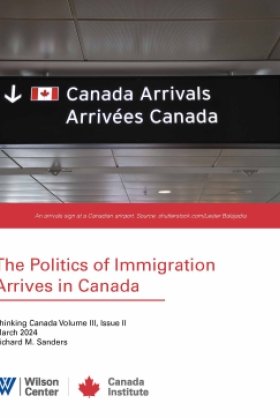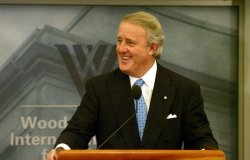Lecture: "Our Courts"
The Honorable Sandra Day O'Connor, Associate Justice, United States Supreme Court (Retired); Molly Kervin, Teacher, Palo Verde Middle School, Phoenix, and her studentsThis event will take place at the Sandra Day O'Connor College of Law, Arizona State University, Tempe, Ariz.
Overview
Can video games save American democracy? Perhaps, if Justice Sandra Day O'Connor is behind them. The games are part of a new website Justice O'Connor has launched in an effort to revive civics education in public schools. On January 20, she told an audience of 200 at the Sandra Day O'Connor College of Law at Arizona State University in Tempe how she came to this project. The event was part of the Taube Discussion Series on American Values, which the Wilson Center has organized with generous support from the Taube Philanthropies of Northern California.
Since retiring from the Supreme Court in 2006, Justice O'Connor has been preoccupied with the problem of declining civics education in public schools. Civics classes are disappearing at an alarming rate from high school curricula, she said. Only three states still have mandatory civics classes at the middle-school level.
The result of neglecting civics education for an entire generation, according to Justice O'Connor, is already evident, and predictably discouraging. Only one in seven Americans, for instance, can name the Chief Justice of the Supreme Court, while two thirds can name at least one judge on "American Idol."
Lack of knowledge about the justice system is linked to another of Justice O'Connor's concerns: maintaining an independent judiciary. As long as Americans don't know how the system works, she fears, they will not understand why it is so important to ensure that judicial appointments are made on the merits and not subjected to the winds of party politics.
This state of affairs is what inspired her to action: "We must reverse the trend of removing civics from our schools before cynicism begins to suffocate our democracy."
Unfortunately, Justice O'Connor noted, in the wake of the No Child Left Behind Act, teachers now have to think creatively if they are to work civics into the classroom. With schedules straitened by testing requirements, assigning 800-page textbooks and handing out worksheets simply will not work. "Civics education needs a makeover," she said. "We need to bring it into the 21st century."
The solution she has directed her efforts into is Our Courts, a website aimed at a middle-school age audience with games designed to education about government and citizenship. The games are meant to be as engaging as anything else children might play online. The site has already shown some success; in trial evaluations, many students said that after being exposed to the games in class, they had gone home to play them again on their own time.
This was certainly the case with the 7th and 8th graders who joined the discussion after O'Connor spoke. The students, who came from Palo Verde Middle School in Phoenix, all said they had been surprised to find the online games more fun than they first expected. Their social studies teacher, Molly Kervin, said she had found the website to be a useful tool in the classroom for drawing students into discussion. "Whether we like it or not, we're going to have to accept the reality that this is the way education is going to have to be structured in the future." Students and teacher agreed that using games like the ones on Our Courts would be effective means of teaching and learning other subjects as well.
The students' comments also made clear that the benefits of the website extended beyond the classroom and the field of civics. "I learned that there are many sides to a question, not just the one you thought of first," one boy noted, while another said that playing the games had taught him how to listen to others and engage in debate. And after seeing the handsome facilities at the ASU Law School, several suggested that that they now had legal careers in their sights.
By Richard Iserman
Sonya Michel, Director, United States Studies
Thank you for your interest in this event. Please send any feedback or questions to our Events staff.










